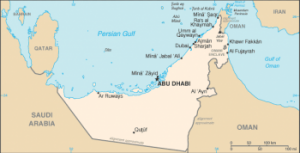We had reported a month ago the dangerous game of provocations underway in the Persian Gulf; we had hoped that it was a clumsy attempt to trigger a strategy of tension to engage the United States in a decisive battle with Iran.
Tension strategy in the Persian Gulf
Today’s renewed mysterious attack on oil tankers in transit in the Gulf of Oman, right in front of the Iranian coast, shows that the attempt is still ongoing. The question naturally arises as to who might be interested in bringing the tension to the threshold level.
The impression is that, once again, Saudi Arabia is active in this extremely dangerous game: this state, founded on an inconsistent national structure, clinging to wahabbita fanaticism, the enormous oil resources it has and the very strong and often opaque ties that connect him from the end of the Second World War to the Anglo-Saxon political-financial ruling classes, he has always perceived Iran as the main enemy, long before Israel, with whom he has more than cordial relations today .
The Saudi role in the destabilization of Afghanistan and Pakistan, through the financing of the Taliban movement; its role, yet to be clarified, in the genesis of the September 11 attacks; the destabilization of Syria, the result of a plan drawn up by some senior Saudi and North American diplomats; the massive intervention in Yemen, not to mention the role played in the civil war in Libya – make Saudi Arabia one of the most ambiguous and dangerous actors for the stability of world peace. Despite all this, the Western media is talking about Saudi Arabia as one of the pillars of moderate Islam!
Plutocracy, exploitation and arsenals
This country, in which a small elite of a few very rich extended families dominates unchallenged over a native population held in line with the stick of a harsh repression, on the one hand, and the carrot of privileged living conditions, thanks to the exploitation of foreign workers that come from the most depressed areas of the world – this is the country that today is pushing the United States to a military confrontation (direct or indirect) with Iran, probably with substantial aid from intelligence, deception and electronic support on the Israeli side.
A few days ago, CNN reported a series of information showing that this country is moving in different directions to strengthen its strategic weapons: the Saudis would ask China for decisive technical support for the development of ballistic missiles; while a nuclear research reactor, formally motivated by the need for hot water production, would have been developed in Riyadh thanks to the collaboration with Argentina.
This last aspect is particularly significant since, according to CNN, a possible evolution in the military sense of the use of the reactor would be favored by some American companies, which have recently been authorized by the US Department of Energy to share with the Saudi some sensitive information.
These measures have been kept secret from the US parliament, provoking the protest of some democratic representatives: the fact remains that to this day the names of the companies remain covered by secrecy. In this regard, Democratic Senator Tim Kaine has publicly noted that at this point there are “serious questions about the fact that the decisions taken concerning nuclear transfers [to Saudi Arabia] are based on the financial ties of the Trump family rather than on the interests of the American people ”.
US arms sales to Saudis
All this after the US president approved another 8 billion dollars in arms sales to Saudi Arabia, the United Arab Emirates and Jordan in May, adding to the giant agreement signed in May 2017 between US and Saudi Arabia, arms sales worth 110 billion dollars.
Assessments by the authoritative Stockholm International Peace Research Institute (SIPRI) show that Saudi arms purchases have thus even doubled in the last four years, after the Arab country already serves as a weapons pre-positioning warehouse for weapons. United States in the Middle East, since the 1990s.
It would not be surprising, in this context, that Saudi Arabia is aiming for US intervention to eliminate the Iranian risk, as already happened with Iraq in 2003.
In fact, just a few hours ago, American source rumors referred to a plan by the US presidency to deploy over 100,000 men in the Middle East.
A piece of news that could suggest that the Saudi strategy may have found wide audiences in some extremist American sectors (for example those that report to the National Security Advisor, John Bolton), which are now also strong with the support of the Israeli-American lobby authoritatively represented by Trump’s son-in-law.


